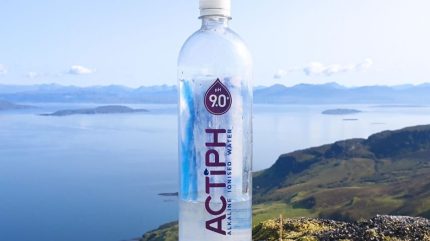
UK bottled-water maker Actiph is eyeing fresh funding to increase production capacity and expand into the Middle East and Asia.
The Edinburgh, Scotland-headquartered business is looking to raise over £10m ($12.63m) to increase production and support its expansion into new markets.
It plans to raise the money via a new strategic or venture capital partnership.
Founded in 2015, Actiph produces alkaline ionised bottled waters in glass and plastic bottles, as well as a range of energy drinks and flavoured vitamin waters.
The company plans to enter five new markets in the Middle East and Asia by the end of 2024. These include the Philippines, Singapore, Thailand, Vietnam, and Hong Kong in China, where it is in the process of establishing new partnerships with co-packers for its water brand.
It also aims to launch operations at one more co-packing site in Europe in the next year.
How well do you really know your competitors?
Access the most comprehensive Company Profiles on the market, powered by GlobalData. Save hours of research. Gain competitive edge.

Thank you!
Your download email will arrive shortly
Not ready to buy yet? Download a free sample
We are confident about the unique quality of our Company Profiles. However, we want you to make the most beneficial decision for your business, so we offer a free sample that you can download by submitting the below form
By GlobalDataSpeaking to Just Drinks at the IFE trade show in London yesterday (25 March), Actiph founder Jamie Douglas-Hamilton said: “We’re looking to do a fundraise… starting next year to really accelerate.
“It’s very much [about] scaling up, so making it work across different geographies and having marketing campaigns in more countries as well as improve our sustainability so that we can have co-packers in different countries [and] don’t need to ship as much.”
He added: “That’s what makes us more sustainable than any other water brands. You can make [the product] in every single country, your water source doesn’t matter because you’re purifying the water, you’re stripping everything out of it and remineralising it then ionising. So once we’ve built that system we can then put it into any water plant.”
When asked why the business was looking to move into Asia and the Middle East, Douglas-Hamilton said: “We want to be the brand that captures the alkaline water space and [demand] for hydration outside the US on a global scale.”
Explaining why Actiph wasn’t looking to sell in the US, he said the country presented “huge logistical problems”, such as the need for direct distribution and co-packing across multiple states. “You have to go through distributors that are very expensive and [that] makes your business model very hard to make any kind of profits until you’ve reached very large sales,” he added.
Actiph’s key markets include the UK, where it sells to major retailers like Tesco and online through Amazon. This is followed by Ireland, the UAE and Saudi Arabia, Spain, France and the Netherlands.
The group is also in the process of rolling out a 330ml can across all of its markets direct-to-consumer via the company website, as well as through independent retailers.
When asked about why it has decided to enter the canned category for water, Douglas-Hamilton said: “Canned is a hugely growing market and [there are] a lot of people that don’t want PET or [other] plastic bottles.”
He added: “People like drinking water out of a can and it’s catching on… For example, foodservice and a lot of offices have banned plastic, there’s a lot of festivals that have banned plastic, there’s a lot of events that ban plastic entirely, so this gives us another option. Glass is very expensive, so you get less volume in the glass, and then you have breakages, so canned is the perfect solution.”
Actiph’s energy drinks and bottled waters are made at a facility in Wales and in Shropshire in the UK, which is where it sources its natural spring water.
Its annual production capacity for water sits around 50 million liters.
Douglas-Hamilton declined to comment on annual revenues but said the group had seen “close to 60% growth” in 2023 and was looking to double that in 2024.



